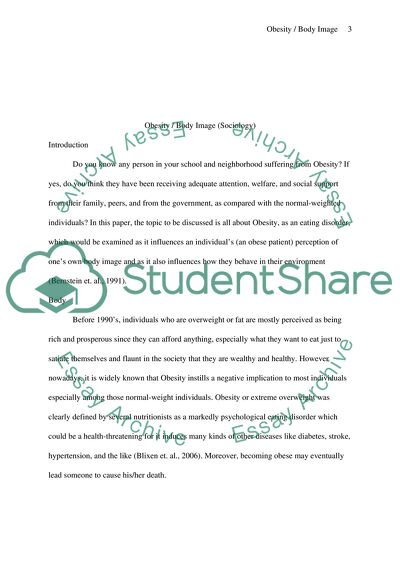
- Home
- Free Samples
- Premium Essays
- Editing Services
- Extra Tools
- Essay Writing Help
- About Us
- Studentshare
- Subjects
- Miscellaneous
- Obesity/body image (Sociology) Final Project
Obesity/body image (Sociology) Final Project - Essay Example

- Subject: Miscellaneous
- Type: Essay
- Level: Undergraduate
- Pages: 4 (1000 words)
- Downloads: 0
- Author: horace22
Extract of sample "Obesity/body image (Sociology) Final Project"
Symbolic Interactionism is the perspective which exemplifies the attitude of individuals towards Obesity. Their negative interpretation for Obesity induces their likelihood to react negatively with obese individuals and even make fun of them. Thus, societal institutions should involve themselves in programs to eliminate prevalence of Obesity and provide adequate information to individuals. Do you know any person in your school and neighborhood suffering from Obesity? If yes, do you think they have been receiving adequate attention, welfare, and social support from their family, peers, and from the government, as compared with the normal-weighted individuals?
In this paper, the topic to be discussed is all about Obesity, as an eating disorder, which would be examined as it influences an individual’s (an obese patient) perception of one’s own body image and as it also influences how they behave in their environment (Bernstein et. al., 1991). Before 1990’s, individuals who are overweight or fat are mostly perceived as being rich and prosperous since they can afford anything, especially what they want to eat just to satiate themselves and flaunt in the society that they are wealthy and healthy.
However nowadays, it is widely known that Obesity instills a negative implication to most individuals especially among those normal-weight individuals. Obesity or extreme overweight was clearly defined by several nutritionists as a markedly psychological eating disorder which could be a health-threatening for it induces many kinds of other diseases like diabetes, stroke, hypertension, and the like (Blixen et. al., 2006). Moreover, becoming obese may eventually lead someone to cause his/her death.
However, apparently, the perception of individuals with regard to Obesity has been occurring to be continuously changing across the years. Once a positive concept of
...Download file to see next pages Read MoreCHECK THESE SAMPLES OF Obesity/body image (Sociology) Final Project
Body Image and Gender
Obesity/body image (Sociology) Part II
Obesity/body image (Sociology) Part III
Body Image
Personal Health Project: Obesity
Food, Drink and Culture
Modernity Lifestyle and Obesity in the United Kingdom
History, Economy, Background, and Architecture of Kuwait

- TERMS & CONDITIONS
- PRIVACY POLICY
- COOKIES POLICY